高考英语被动语态、条件状语从句和让步状语从句导学案
- 格式:doc
- 大小:111.00 KB
- 文档页数:11
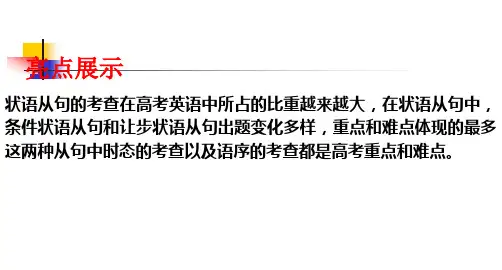
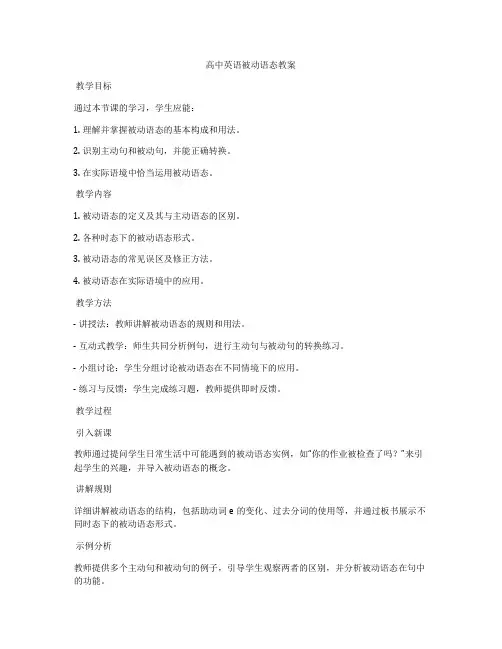
高中英语被动语态教案教学目标通过本节课的学习,学生应能:1. 理解并掌握被动语态的基本构成和用法。
2. 识别主动句和被动句,并能正确转换。
3. 在实际语境中恰当运用被动语态。
教学内容1. 被动语态的定义及其与主动语态的区别。
2. 各种时态下的被动语态形式。
3. 被动语态的常见误区及修正方法。
4. 被动语态在实际语境中的应用。
教学方法- 讲授法:教师讲解被动语态的规则和用法。
- 互动式教学:师生共同分析例句,进行主动句与被动句的转换练习。
- 小组讨论:学生分组讨论被动语态在不同情境下的应用。
- 练习与反馈:学生完成练习题,教师提供即时反馈。
教学过程引入新课教师通过提问学生日常生活中可能遇到的被动语态实例,如“你的作业被检查了吗?”来引起学生的兴趣,并导入被动语态的概念。
讲解规则详细讲解被动语态的结构,包括助动词e的变化、过去分词的使用等,并通过板书展示不同时态下的被动语态形式。
示例分析教师提供多个主动句和被动句的例子,引导学生观察两者的区别,并分析被动语态在句中的功能。
句型转换实践学生尝试将主动句转换为被动句,并进行小组内讨论,教师巡回指导,纠正常见错误。
应用练习设计情景模拟活动,如编写新闻报道、描述事件发生的过程等,要求学生使用被动语态来完成。
总结反馈课程结束前,教师总结被动语态的关键点,并对学生的练习进行点评,强调正确使用的重要性。
教学评价通过课堂提问、练习题和小测验等方式,评估学生对被动语态掌握的程度。
教学反思课后,教师应根据学生的表现和反馈,反思教学方法和内容的有效性,以便不断优化教学策略。
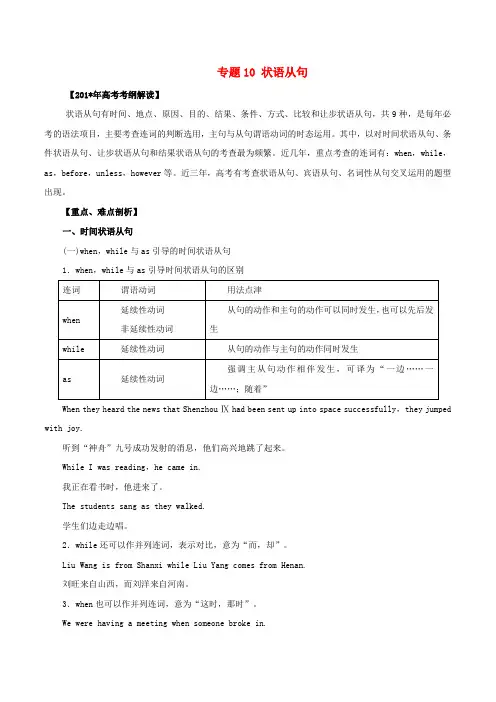
专题10 状语从句【201*年高考考纲解读】状语从句有时间、地点、原因、目的、结果、条件、方式、比较和让步状语从句,共9种,是每年必考的语法项目,主要考查连词的判断选用,主句与从句谓语动词的时态运用。
其中,以对时间状语从句、条件状语从句、让步状语从句和结果状语从句的考查最为频繁。
近几年,重点考查的连词有:when,while,as,before,unless,however等。
近三年,高考有考查状语从句、宾语从句、名词性从句交叉运用的题型出现。
【重点、难点剖析】一、时间状语从句(一)when,while与as引导的时间状语从句1.when,while与as引导时间状语从句的区别When they heard the news that Shenzhou Ⅸ had been sent up into space successfully,they jumped with joy.听到“神舟”九号成功发射的消息,他们高兴地跳了起来。
While I was reading,he came in.我正在看书时,他进来了。
The students sang as they walked.学生们边走边唱。
2.while还可以作并列连词,表示对比,意为“而,却”。
Liu Wang is from Shanxi while Liu Yang comes from Henan.刘旺来自山西,而刘洋来自河南。
3.when也可以作并列连词,意为“这时,那时”。
We were having a meeting when someone broke in.我们正在开会这时突然有人闯了进来。
(二)before与since引导的时间状语从句1.before与since的常用句式It will be two years before he leaves the country.再过两年他才会离开这个国家。
It wasn't two years before he left the country.不到两年他就离开了这个国家。
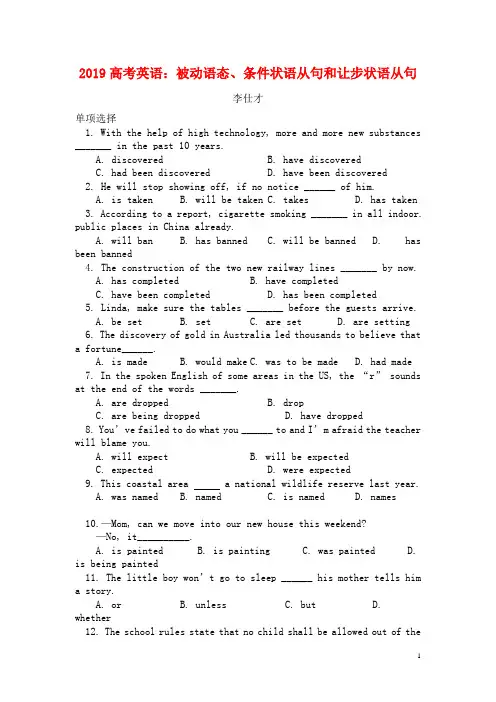
2019高考英语:被动语态、条件状语从句和让步状语从句李仕才单项选择1. With the help of high technology, more and more new substances _______ in the past 10 years.A. discoveredB. have discoveredC. had been discoveredD. have been discovered2. He will stop showing off, if no notice ______ of him.A. is takenB. will be takenC. takesD. has taken3. According to a report, cigarette smoking _______ in all indoor public places in China already.A. will banB. has bannedC. will be bannedD. has been banned4. The construction of the two new railway lines _______ by now.A. has completedB. have completedC. have been completedD. has been completed5. Linda, make sure the tables _______ before the guests arrive.A. be setB. setC. are setD. are setting6. The discovery of gold in Australia led thousands to believe thata fortune______.A. is madeB. would makeC. was to be madeD. had made7. In the spoken English of some areas in the US, the “r” sounds at the end of the words _______.A. are droppedB. dropC. are being droppedD. have dropped8. You’ve failed to do what you ______ to and I’m afraid the teacher will blame you.A. will expectB. will be expectedC. expectedD. were expected9. This coastal area a national wildlife reserve last year.A. was namedB. namedC. is namedD. names10.—Mom, can we move into our new house this weekend?—No, it__________.A. is paintedB. is paintingC. was paintedD. is being painted11. The little boy won’t go to sleep ______ his mother tells hima story.A. orB. unlessC. butD. whether12. The school rules state that no child shall be allowed out of theschool during the day, ______ accompanied by an adult.A. onceB. whenC. ifD. unless13. _______they decide which college to go to, students should research the admission procedures.A. AsB. WhileC. UntilD. Once14. —Our holiday cost a lot of money.—Did it? Well, that doesn’t matter ______ you enjoyed yourselves.A. as long asB. unlessC. as soon asD. though15. All the dishes in this menu, ______ otherwise stated, will serve two to three people.A. asB. ifC. thoughD. unless16. The medicine works more effectively ______ you drink some hot water after taking it.A. asB. untilC. althoughD. if17. —Do you have a minute? I’ve got something to tell you.—OK, ________you make it short.A. now thatB. if onlyC. so long asD. every time18. The doctor would allow him to go home _____ he remained in bed.A. as thoughB. for fear thatC. on condition thatD. as far as19. Too high house prices can be brought under control, _______ the authorities introduce a series of regulatory policies.A. even ifB. as ifC. so thatD. provided that20. My parents don’t mind what job I do ______ I am happy.A. even thoughB. as long asC. as soon asD. as though21. Though _______ to see us, the professor gave us a warm welcome.A. surprisingB. was surprisedC. surprisedD. being surprised22. —How about camping this weekend, just for a change?—OK, ______ you want.A. whicheverB. howeverC. whateverD. whoever23. The engineers are so busy that they have zero time for outdoor sports activities, ______they have the interest.A. whereverB. wheneverC. even ifD. as if24. Tim is in good shap e physically ______ he doesn’t get much exercise.A. ifB. even thoughC. unlessD. as long as25. _______ the police thought he was the most likely one, since they had no exact proof about it, they could not arrest him.A. AlthoughB. As long asC. If onlyD. As soonas26. The lawyer seldom wears anything other than a suit _______ the season.A. whateverB. whereverC. wheneverD. however27. All people, ______ they are old or young, rich or poor, have been trying their best to help those in need since the disaster.A. even ifB. whetherC. no matterD. however28. ______ well prepared a gymnast is, he still needs a lot of luck in performing.A. WhateverB. AlthoughC. No matterD. However29. —Some Chinese students find it difficult to understand native speakers when in London.—Exactly, ______ they’ve learned a lot about grammar and known many words.A. if onlyB. now thatC. as ifD. even if30. _______ your next high-adventure trip is scheduled, start preparing now.A. In caseB. UnlessC. Only ifD. Whenever1. D 解析:考查时态和语态。
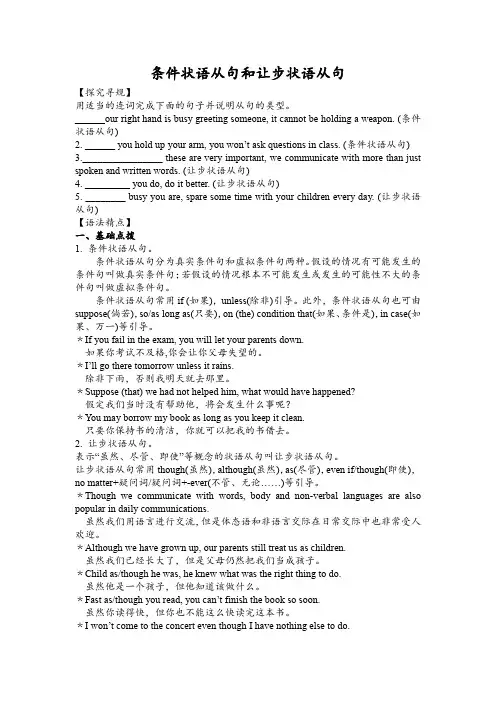
条件状语从句和让步状语从句【探究寻规】用适当的连词完成下面的句子并说明从句的类型。
__ our right hand is busy greeting someone, it cannot be holding a weapon. (条件状语从句)2. ______ you hold up your arm, you won’t ask questions in class. (条件状语从句)3.________________ these are very important, we communicate with more than just spoken and written words. (让步状语从句)4. _________ you do, do it better. (让步状语从句)5. ________ busy you are, spare some time with your children every day. (让步状语从句)【语法精点】一、基础点拨1. 条件状语从句。
条件状语从句分为真实条件句和虚拟条件句两种。
假设的情况有可能发生的条件句叫做真实条件句;若假设的情况根本不可能发生或发生的可能性不大的条件句叫做虚拟条件句。
条件状语从句常用if (如果),unless(除非)引导。
此外,条件状语从句也可由suppose(倘若),so/as long as(只要),on (the) condition that(如果、条件是),in case(如果、万一)等引导。
﹡If you fail in the exam, you will let your parents down.如果你考试不及格,你会让你父母失望的。
﹡I’ll go th ere tomorrow unless it rains.除非下雨,否则我明天就去那里。
﹡Suppose (that) we had not helped him, what would have happened?假定我们当时没有帮助他,将会发生什么事呢?﹡You may borrow my book as long as you keep it clean.只要你保持书的清洁,你就可以把我的书借去。
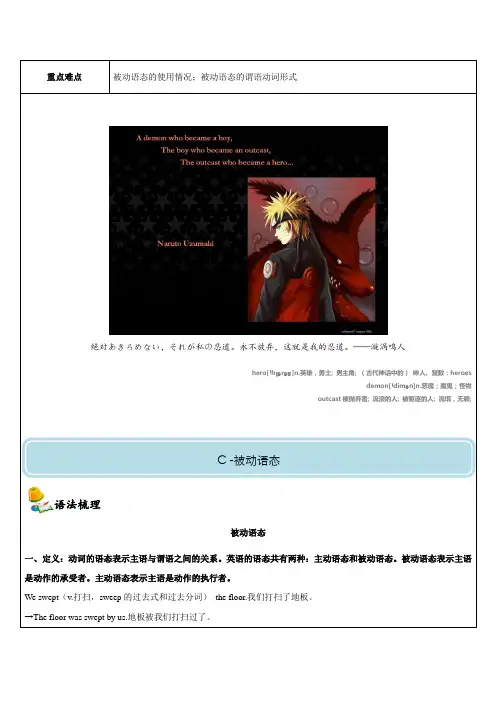
重点难点被动语态的使用情况;被动语态的谓语动词形式绝対あきらめない,それが私の忍道。
永不放弃,这就是我的忍道。
——漩涡鸣人hero[ˈhɪərəʊ]n.英雄,勇士; 男主角; (古代神话中的)神人。
复数:heroesdemon[ˈdimən]n.恶魔;魔鬼;怪物outcast被抛弃者; 流浪的人; 被驱逐的人; 流氓,无赖;C -被动语态语法梳理被动语态一、定义:动词的语态表示主语与谓语之间的关系。
英语的语态共有两种:主动语态和被动语态。
被动语态表示主语是动作的承受者。
主动语态表示主语是动作的执行者。
We swept(v.打扫,sweep的过去式和过去分词)the floor.我们打扫了地板。
→The floor was swept by us.地板被我们打扫过了。
二、被动语态的构成:主语+助动词be +及物动词的过去分词+(by+宾语)其中,by意为“被……;由……”,表动作的执行者,在不知道或不强调动作的执行者时,“by+宾语”可以省略。
The glass is broken by that boy.玻璃杯是那个男孩打破的。
(→主动句:That boy broke the glass.)be有人称、数和时态的变化,其肯定式、否定式、疑问式的变化规则与be作为连系动词时完全一样。
English is widely spoken around the world. (肯定式)English is not widely spoken around the world. (否定式)Is English widely spoken around the world? (疑问式)Yes, it is./No, it isn’t.People grow rice in the south.Rice is grown (by people) in the south.三、被动语态的用法:1.在没有指明动作的执行者或者不知道动作执行者的情况下,可用被动语态。
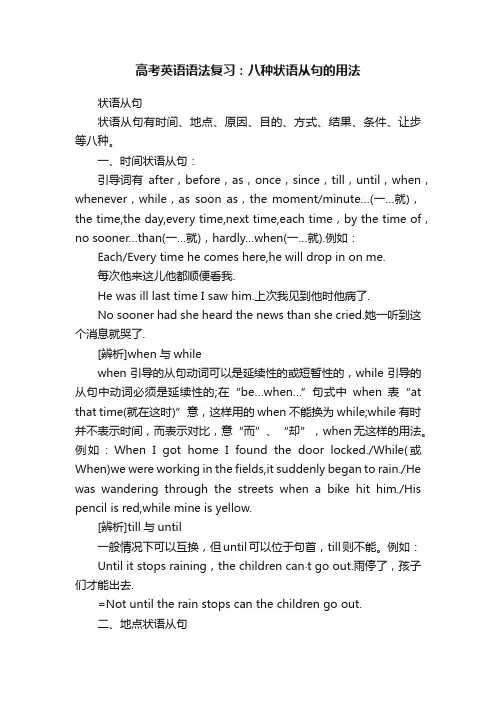
高考英语语法复习:八种状语从句的用法状语从句状语从句有时间、地点、原因、目的、方式、结果、条件、让步等八种。
一、时间状语从句:引导词有after,before,as,once,since,till,until,when,whenever,while,as soon as,the moment/minute…(一…就),the time,the day,every time,next time,each time,by the time of,no sooner…than(一…就),hardly…when(一…就).例如:Each/Every time he comes here,he will drop in on me.每次他来这儿他都顺便看我.He was ill last time I saw him.上次我见到他时他病了.No sooner had she heard the news than she cried.她一听到这个消息就哭了.[辨析]when与whilewhen引导的从句动词可以是延续性的或短暂性的,while引导的从句中动词必须是延续性的;在“be…when…”句式中when表“at that time(就在这时)”意,这样用的when不能换为while;while有时并不表示时间,而表示对比,意“而”、“却”,when无这样的用法。
例如:When I got home I found the door locked./While(或When)we were working in the fields,it suddenly began to rain./He was wandering through the streets when a bike hit him./His pencil is red,while mine is yellow.[辨析]till与until一般情况下可以互换,但until可以位于句首,till则不能。
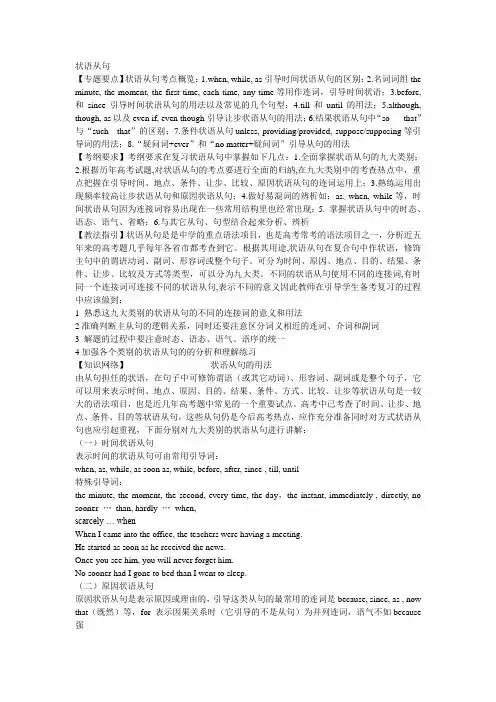
状语从句【专题要点】状语从句考点概览:1.when, while, as引导时间状语从句的区别;2.名词词组the minute, the moment, the first time, each time, any time等用作连词,引导时间状语;3.before,和since引导时间状语从句的用法以及常见的几个句型;4.till和until的用法;5.although, though, as以及even if, even though引导让步状语从句的用法;6.结果状语从句中“so ----that”与“such---that”的区别;7.条件状语从句unless, providing/provided, suppose/supposing等引导词的用法;8.“疑问词+ever”和“no matter+疑问词”引导从句的用法【考纲要求】考纲要求在复习状语从句中掌握如下几点:1.全面掌握状语从句的九大类别;2.根据历年高考试题,对状语从句的考点要进行全面的归纳,在九大类别中的考查热点中,重点把握在引导时间、地点、条件、让步、比较、原因状语从句的连词运用上;3.熟练运用出现频率较高让步状语从句和原因状语从句;4.做好易混词的辨析如:as, when, while等,时间状语从句因为连接词容易出现在一些常用结构里也经常出现;5. 掌握状语从句中的时态、语态、语气、省略;6.与其它从句、句型结合起来分析、辨析【教法指引】状语从句是是中学的重点语法项目,也是高考常考的语法项目之一,分析近五年来的高考题几乎每年各省市都考查到它。
根据其用途,状语从句在复合句中作状语,修饰主句中的谓语动词、副词、形容词或整个句子。
可分为时间、原因、地点、目的、结果、条件、让步、比较及方式等类型,可以分为九大类。
不同的状语从句使用不同的连接词,有时同一个连接词可连接不同的状语从句,表示不同的意义因此教师在引导学生备考复习的过程中应该做到:1 熟悉这九大类别的状语从句的不同的连接词的意义和用法2准确判断主从句的逻辑关系,同时还要注意区分词义相近的连词、介词和副词3 解题的过程中要注意时态、语态、语气、语序的统一4加强各个类别的状语从句的的分析和理解练习【知识网络】状语从句的用法由从句担任的状语,在句子中可修饰谓语(或其它动词)、形容词、副词或是整个句子,它可以用来表示时间、地点、原因、目的、结果、条件、方式、比较、让步等状语从句是一较大的语法项目,也是近几年高考题中常见的一个重要试点。
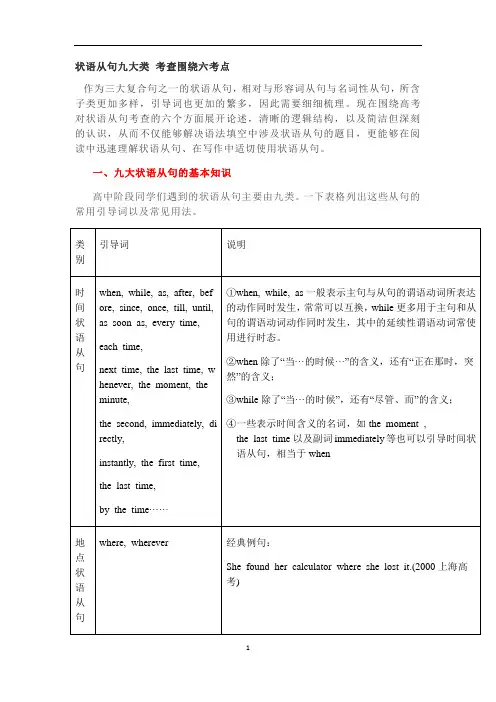
状语从句九大类考查围绕六考点作为三大复合句之一的状语从句,相对与形容词从句与名词性从句,所含子类更加多样,引导词也更加的繁多,因此需要细细梳理。
现在围绕高考对状语从句考查的六个方面展开论述,清晰的逻辑结构,以及简洁但深刻的认识,从而不仅能够解决语法填空中涉及状语从句的题目,更能够在阅读中迅速理解状语从句、在写作中适切使用状语从句。
一、九大状语从句的基本知识高中阶段同学们遇到的状语从句主要由九类。
一下表格列出这些从句的常用引导词以及常见用法。
二、高考对状语从句的常规考查:选择适切连词(一)时间状语从句(1) Last winter ______I went there again, they had a big separate house to raise dozens of chickens.(2018 年全国卷Ⅰ短文改错改编)【分析】句意:去年冬天,当我再次回去的时候,他们有一个单独的房子,里面养了几十只鸡。
根据句意,空白处应填连词when/as,意为“当……的时候”。
(2)_______fat and salt are removed from food, the food tastes as if it is missing something. (2017年全国卷Ⅰ语法填空改编)【分析】句意:当把油和盐从食物中去掉的时候,食物尝起来好像缺少点什么东西。
根据句意,空白处应填连词When/As,意为“当……的时候”。
(3)______the average age of the population increases,there are more and more old people to care for.(2016 年天津卷单项填空第 7 题改编)【分析】句意:随着人口平均年龄的增长,有越来越多的老人需要照顾。
根据句意,空白处应填连词As,意为“随着”。
(4)_______I started the car, my mind went blank.(2017 年全国卷Ⅰ短文改错改编)【分析】句意:一旦我发动车,我的大脑一片空白。
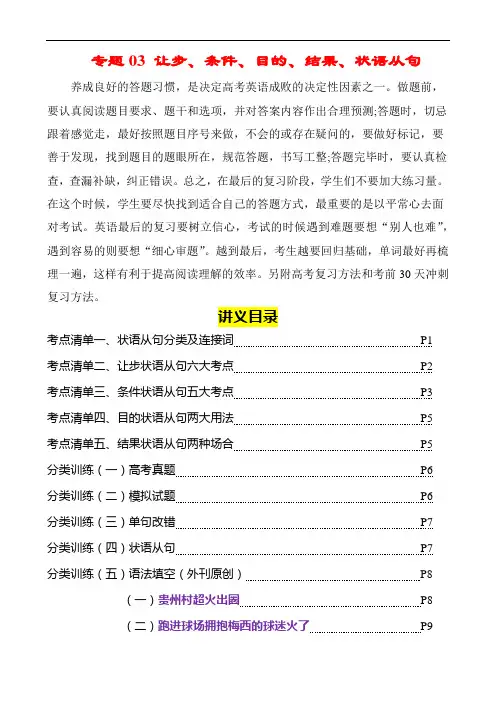
专题03 让步、条件、目的、结果、状语从句养成良好的答题习惯,是决定高考英语成败的决定性因素之一。
做题前,要认真阅读题目要求、题干和选项,并对答案内容作出合理预测;答题时,切忌跟着感觉走,最好按照题目序号来做,不会的或存在疑问的,要做好标记,要善于发现,找到题目的题眼所在,规范答题,书写工整;答题完毕时,要认真检查,查漏补缺,纠正错误。
总之,在最后的复习阶段,学生们不要加大练习量。
在这个时候,学生要尽快找到适合自己的答题方式,最重要的是以平常心去面对考试。
英语最后的复习要树立信心,考试的时候遇到难题要想“别人也难”,遇到容易的则要想“细心审题”。
越到最后,考生越要回归基础,单词最好再梳理一遍,这样有利于提高阅读理解的效率。
另附高考复习方法和考前30天冲刺复习方法。
讲义目录考点清单一、状语从句分类及连接词P1考点清单二、让步状语从句六大考点P2考点清单三、条件状语从句五大考点P3考点清单四、目的状语从句两大用法P5考点清单五、结果状语从句两种场合P5分类训练(一)高考真题P6分类训练(二)模拟试题P6分类训练(三)单句改错P7分类训练(四)状语从句P7分类训练(五)语法填空(外刊原创)P8 (一)贵州村超火出圈P8(二)跑进球场拥抱梅西的球迷火了P9(三)二十四节气之小暑P10考点清单一、状语从句分类及连接词考点清单二、让步状语从句六大考点要点精讲1:though/although引导的让步状语从句①although引导让步状语从句时,只能用正常语序;②though引导让步状语从句时,可用正常语序,与although替换,也可用倒装语序,与as替换。
特别③注意:although, though从句均不能与but连用。
Although/Though he is very old, (yet) he is quite strong.他虽然年纪大了,身体还很健壮。
Although/Though he was exhausted, he(still) kept on working.虽然他已经精疲力竭了,但他仍然继续工作。
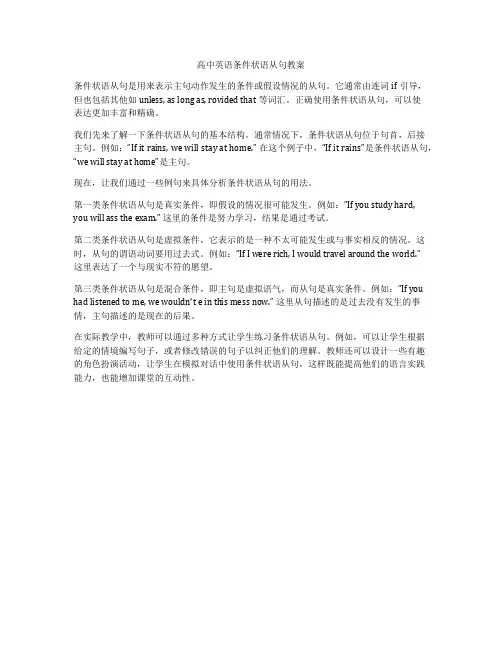
高中英语条件状语从句教案条件状语从句是用来表示主句动作发生的条件或假设情况的从句。
它通常由连词if引导,但也包括其他如unless, as long as, rovided that等词汇。
正确使用条件状语从句,可以使表达更加丰富和精确。
我们先来了解一下条件状语从句的基本结构。
通常情况下,条件状语从句位于句首,后接主句。
例如:“If it rains, we will stay at home.” 在这个例子中,“If it rains”是条件状语从句,“we will stay at home”是主句。
现在,让我们通过一些例句来具体分析条件状语从句的用法。
第一类条件状语从句是真实条件,即假设的情况很可能发生。
例如:“If you study hard, you will ass the exam.” 这里的条件是努力学习,结果是通过考试。
第二类条件状语从句是虚拟条件,它表示的是一种不太可能发生或与事实相反的情况。
这时,从句的谓语动词要用过去式。
例如:“If I were rich, I would travel around the world.”这里表达了一个与现实不符的愿望。
第三类条件状语从句是混合条件,即主句是虚拟语气,而从句是真实条件。
例如:“If you had listened to me, we wouldn't e in this mess now.” 这里从句描述的是过去没有发生的事情,主句描述的是现在的后果。
在实际教学中,教师可以通过多种方式让学生练习条件状语从句。
例如,可以让学生根据给定的情境编写句子,或者修改错误的句子以纠正他们的理解。
教师还可以设计一些有趣的角色扮演活动,让学生在模拟对话中使用条件状语从句,这样既能提高他们的语言实践能力,也能增加课堂的互动性。
2024年高中英语语法学习之状语从句精讲英语状语从句是英语学习中的一个重要考点,下面将针对英语状语从句进行考点归纳。
一、时间状语从句时间状语从句是语法中的一个重要考点,下面是一些常见的时间状语从句: when:表示某个时间点或时间段,如“I will arrive at the airport when the plane takes off.”before:表示某个时间点或时间段之前,如“I will eat breakfast before I go to work.”after:表示某个时间点或时间段之后,如“I will finish my homework after I have dinner.”while:表示某个时间点或时间段持续,如“I was studying while she was sleeping.”as soon as:表示某个时间点或时间段一过去就发生,如“I will call you as soon as I get home.”until:表示某个时间点或时间段一直持续,如“I won't leave until I have finished my work.”since:表示某个时间点或时间段以来,如“I have been living in this city since I moved here last year.”when/while/as:这些词都可以引导时间状语从句,但它们的使用略有不同,需要根据具体语境选择使用哪个。
需要注意的是,如果主句是一般将来时,从句只能用一般现在时,如“I will go to the store tomorrow”中的“tomorrow”就是时间状语从句。
二、地点状语从句地点状语从句是语法中的一个重要考点,下面是一些常见的地点状语从句: where:表示某个地点,如“I will go to the store where I bought the groceries.”that:表示某个地点或位置,如“I saw a beautiful sunset over that mountain.”which:表示某个地点或位置,如“The building which is on fire needs to be evacuated immediately.”where/that/which:这些词都可以引导地点状语从句,但它们的使用略有不同,需要根据具体语境选择使用哪个。
高考英语状语从句专项讲解一、考点分析状语从句主要考点在语法填空、翻译和作文。
二、专题详解状语从句梳理知识点1:分类语从句可以分为以下九种:1、时间状语从句2、地点状语从句3、原因状语从句4、目的状语从句5、结果状语从句6、条件状语从句7、方式状语从句8、让步状语从句9、比较状语从句知识点2:具体用法1) 时间状语从句:as soon as Hardly/scarcely had…whenNo sooner had …than….the moment.. the instant…the second…immediately directly…instantly…①As soon as I arrive in Shanghai, I’ll writeto you.我一到上海就给你写信。
② Hardly (scarcely) had I got homewhen it began to rain.我刚一到家就下雨了。
③No sooner had we got to the stationthan the train left.我们刚到车站,火车就走了。
④We had just begun the moment wewere told to stop.我们刚开始就被叫停。
⑤I felt cheerful immediately I heard thesong.我一听到这首歌就感到很愉快。
①hardly…when和nosooner…than的意义相当于as soon as,但只表示过去发生的事情,主句为过去完成时,从句为过去时,如hardly或no sooner位于句首时语气强,而且主句的谓语要用部分倒装。
②名词短语连词:“一……就……”主句+ the moment…从句主句+the instant…从句主句+the second…从句③ 副词短语连词:主句+ immediately +从句主句+ directly +从句主句+ instantly+从句every time =each time last time…next time…the first time ①Every time I traveled by boat, I gotseasick.我每次乘船都晕船。
枣庄二中英语组曹久锋Module3 Body Language and Non-verbal CommunicationGrammarAdverbial clause of condition and concessionAdverbial clause of condition and concession学习目标:学习目标:熟记引导条件状语从句与让步状语从句的连词并能在语境中正确使用《If I let you go》Can you catch the lyrics?But if I let you go, I will never know what my life would be, holding you close to me。
表“条件”的连词:Adverbial clause of condition?①If he isnot in the office, he must be out for lunch.②You may borrow the book as long as you keep it clean.③Send me a message in case you have any difficulty.④You could go swimming on condition that(=if) youdidn’t go too far away from the river bank.⑤You’ll fail the exam unless you study hard.自学任务一:观察下列例句,明确引导词的词义并总结其时态的使用。
Summary定义:条件状语从句的考点:1)引导条件状语从句的连词: If, unless, so/as long as, on condition that,suppose, supposing, providing (that), provided(that)... ...2) 时态:在条件状语从句中,从句的谓语动词通常要用一般现在时或一般过去时代替一般将来时或过去将来时。
状语从句1.状语概念: 状语修饰动词、形容词、副词或全句,说明方式、因果、条件、时间、地点、让步、方向、程度、目的等。
2.可以作状语的成分:The boy really needs a pen. 副词He is walking on the street. 介词短语He sits there, asking for a pen. 非谓语doingThe boy needs a pen to do his homework. 非谓语to doWhen he came in,his mother was cooking. 从句3.状语从句概念:是指句子用作状语时,起副词作用的句子。
状语从句中的从句可以修饰谓语、非谓语动词、定语、状语或整个句子。
4.状语从句的实质与分类用不同的连词将几个分句连接起来,表达分句之间特定的逻辑关系。
反过来,我们要想表达分句之间不同的逻辑关系,就要选择不同的连词。
看下面句子:I arrived home.It began to rain.看下面句子:He will not go to the cinemaHe is very busy.分类:根据不同的逻辑关系,我们把状语从句分为9种。
时间状语从句,地点状语从句,原因状语从句,条件状语从句,方式状语从句,让步状语从句,比较状语从句,结果状语从句,目的状语从句。
5.状语从句分类讲解141414141414141414【时间状语从句精练】1.As is reported, it is 100 years ________Qinghua University was founded.A. whenB. beforeC. afterD. Since2. He had no sooner finished his speech the students started cheering.A. sinceB. asC. whenD. than3. One Friday, we were packing to leave for a weekend away__my daughter heard cries for help.A. afterB. whileC. sinceD. when4. Mary made coffee ________ her guests were finishing their meal.A.so that B although C. while D. as if5.John thinks it won’t be long he is ready for his new job.A. whenB. afterC. beforeD. since6. You can’t borrow books from the school library __ you get your student card.A.beforeB. ifC. whileD. as7.Peter was so excited he received invitation from his friend to visit Chongqing.A. whereB. thatC. whyD. when8. The field research will take Joan and Paul about five months; it will be a long time ____ we meet them again.A. afterB. beforeC. sinceD. when 【条件状语从句精练】1.I won’t call you, ________ something unexpected happens.A. unlessB. whetherC. becauseD. while2.______ he had not hurt his leg, John would have won the race.A. IfB. SinceC. ThoughD. When3.You will be successful in the interview you have confidence.A. beforeB. onceC. untilD. though4.He had his camera ready __he saw something that would make a good picture.A. even ifB. if onlyC. in caseD. so that5. My parents don’t mind what job I do I am happy.A. even thoughB. as soon asC. as long asD. as though6.We’ll have a picnic in the park this Sunday _____ it rains or it’s very cold.A. sinceB. ifC. unlessD. until7.you’ve tried it,you can’t imagine how pleasant it is.A. UnlessB. BecauseC. AlthoughD. When【让步状语从句精练】1._______this is only a small town,it's crowded with tourists who come here allyear round.A.SinceB.UnlessC.OnceD.Although2.Allow children the space to voice their opinionsthey are different from your own.A.untilB.even ifC.unlessD.as though3._________,Carolina couldn’t get the door open.A.Try as she mightB.As she might tryC.She might as tryD.Might she as try4.___he has limited technical knowledge,the old worker has a lot of experience.A.SinceB.unlessC.AsD.Although5.______the Internet is of great help,I don’t think it’s a good idea to spend toomuch time on it.A.IfB.WhileC.BecauseD.As6.There was never any time for Kate to feel lonely,____she was an only child.A.ever sinceB.now thatC.even thoughD.even as7.________I really don’t like art,I find his work impressive.A.As B.Since C.If D.While8.All people,______they are old or young,rich or poor,have been trying theirbest to help those in need since the disaster.14A.even ifB.whetherC.no matterD.however9. —Dad,I’ve finished my assignment.—Good,and________you play or watch TV,you mustn't disturb me.A.wheneverB.whetherC.whateverD.no matter【原因状语从句精练】1.you’ve got a chance,you might as well make full use of it.A.Now thatB.AfterC.AlthoughD.As soon as2.He found it increasingly difficult to read,his eyesight was beginning to fail.A.andB.forC.butD.or3.A man cannot smile like a child,____a child smiles with his eyes,while a ma n smiles with his lips alone.A.soB.butC.andD.for4.—Coach,can I continue with the training?—Sorry,you can't________you haven't recovered from the knee injury.A.untilB.beforeC.asD.unless5.—Did you return Fred’s call?—I didn’t need to I’ll see him tomorrow.A. thoughB. unlessC. whenD. because【地点状语从句精练】1.—Mom,what did the doctor say?—He advised me to live the air is fresher.A.in whereB.in whichC.the place whereD.where2.In peace,too,the Red Cross is expected to send help there is humansuffering.A.whoeverB.howeverC.whateverD.wherever【结果状语从句精练】1.Pop music is such an important part of society_______it has even influenceour language.A.asB.thatC.whichD.where2.His plan was such a good one we all agreed to accept it.A.soB.andC.thatD.as3.We were in when we left that we forgot the airline tickets.A.a rush so anxiousB.a such anxious rushC.so an anxious rushD.such an anxious rush【目的状语从句精练】1.The police officers in our city work hard _ the rest of us can live a safe life.A. in caseB. as ifC. in order thatD. only if2. I’d like to arrive 20 minutes early I can have time for a cup of tea.A.as soon asB.as a resultC.in caseD.so that3. Roses need special care____they can live through winter.A.becauseB.so thatC.even ifD.as4.Leave your key with a neighbor you lock yourself out one day.A.ever sinceB.even ifC.soon afterD.in case5.I shall stay in the hotel all day there is news of the missing child.A.in caseB.no matterC.in any caseD. ever since14。
被动语态、条件状语从句和让步状语从句李仕才课程目标一、学习目标1. 条件状语从句及其连词的用法。
2. 让步状语从句及其连词的用法。
3. 被动语态。
二、重点、难点重点:条件状语从句、让步状语从句及被动语态。
难点:让步状语从句和名词性从句的区别。
三、考情分析这三种语法是高考考查的重点语法,历年考题中占有重要的地位,一般能在单选中占3-4分;在完形填空中也能占2-3分;我们复习时要特别注意这几种语法及其做题技巧,认真研究近几年的高考题。
知识梳理一、条件状语从句【教材原句】If you say the word “communication”, most people think of words and sentences.如果你说单词“交流”,大部分人会想到单词和句式。
If our right hand is busy greeting someone, it cannot be holding a weapon.如果我们的右手忙着问候别人,它就不可能握有武器。
考点1引导条件状语从句的从属连词【用法】连接词主要有if, unless, as/so long as, on condition that, provided, suppose, supposing 等。
【例句】You can leave now if you like.如果你愿意现在就可以走了。
As long as it doesn’t rain we can go.只要不下雨,我们就可以去。
In case I forget, please remind me about it.万一我忘记,请提醒我一下。
I will come on condition (that) she is invited too.如果邀请她来, 那我就来。
He may go with us provided [providing] he arrives in time.他若及时到达,就可以和我们一起走。
【考题链接】they decide which college to go to, students should research the admission procedures.A. AsB. WhileC. UntilD. Once答案:D解题思路:句意:一旦他们决定去哪个大学,学生就应该搜索入学手续。
once 一旦,根据句意选择D。
考点2条件状语从句的时态【用法】当主句为将来时态或具有将来意义时,条件状语从句通常要用一般现在时表示将来意义,而不能直接使用将来时态。
【例句】Let’s go out for a walk unless you are too tired.如果你不是太累的话,让我们出去散步。
I’ll stay at home if it rains tomorrow.要是明天下雨,我就呆在家里。
【考题链接】We will be losing money this year unless that new economic plan of yours _______ well.A. is workingB. worksC. will be workingD. worked答案:B解题思路:句意:如果你的那个新经济计划效果不好的话,我们今年会失去很多钱。
在条件状语从句中,如果主句用一般将来时态,那么从句用一般现在时态表示将来意义。
考点3if 引导的条件句有真实条件句和非真实条件句两种【用法】真实条件句表示现实情况中可能实现的情况。
非真实条件句也叫虚拟条件句,表示与现实情况相反的假设情况。
【例句】If it rains tomorrow, we won’t go on a picnic.(真实条件句)如果明天下雨,我们就不去野餐了。
If I were you, I would go with him. (非真实条件句)如果我是你,我会跟他一道去。
【考题链接】1. In time of serious accidents, ____ we know some basic things about first aid, we can save lives.A. whetherB. untilC. ifD. unless答案:C解题思路:句意:遇到严重的事故时,如果我们了解一些基础的急救知识,我们就能挽救生命。
if如果;unless如果不……。
2. Mary is ill today. If she _____, she ____ absent from school.A. were not ill, wouldn’t beB. had been ill, wouldn’t have beenC. had been ill, should have beenD. hadn’t been ill, could be答案:A解题思路:句意:玛丽今天病了。
如果她不病,她就不会缺课了。
根据句意可知是虚拟语气的句子,并且指的是和现在事实相反的虚拟,故从句用一般过去时,而主句用would +do,故答案选A。
即学即练1. We all know that, __________, the situation will get worse.A. not if dealt carefully withB. if not carefully dealt withC. if dealt not carefully withD. not if carefully dealt with答案:B解题思路:句意:我们都了解,这种状况如果不认真处理,会变的更糟。
本题考查条件状语从句及省略。
当主语和主句的主语一致并且有be时,省略主语和be; B项等于if the situation is not carefully dealt with,…。
2. _______ I know the money is safe, I shall not worry about it.A. Even thoughB. UnlessC. As long asD. While答案:C解题思路:句意:只要我知道钱是安全的,我就不会担心了。
even though即使;unless 除非;as long as只要;while尽管。
二、让步状语从句考点1whatever, whoever, wherever, whenever, however和no matter what/ who/ where/ when/ how等引导的让步状语从句。
注意1:whatever, whoever, wherever, whenever, however和no matter what/ who/ where/ when/ how等引导让步状语从句时,可以换用,意为:无论……,都……。
注意2:解这一类题目时,要注意连词在让步状语从句中所作的句子成分,另外,还要注意从句的语序。
【例句】Whoever did this will sooner or later be caught and will be punished...不管是谁干的这事,早晚要被抓住并受到惩罚。
Some people enjoy themselves wherever they are...有些人能够随遇而安。
【考题链接】1. _____ well prepared you are, you still need a lot of luck in mountain climbing.A. HoweverB. WhateverC. No matterD. Although答案:A解题思路:此题考查however的用法。
句意:无论你准备的多么充分,在爬山时仍需要运气。
however等于no matter how,但no matter不能单独用。
句中的well是副词,所以用however, 而不用whatever。
2. No matter how , it is not necessarily lifeless.A. a desert may be dryB. dry a desert may beC. may a desert be dryD. dry may a desert be答案:B解题思路:句意:沙漠无论多么干燥,它也肯定有生命。
让步状语从句的顺序必须是陈述语序,故排除A、C和D。
考点2although/though/as引导的让步状语从句。
【用法】1. although和though引导让步状语从句时意为“尽管,虽然”,二者一般可以换用。
要注意although 和though不能和but连用,但可以和yet或still连用。
2. as和though引导的让步状语从句,多使用倒装句。
通常如果从句中有形容词或名词作表语,则把表语置于句首,而且名词前要省略冠词;如果从句中有修饰动词的副词,则将该副词置于句首;如果从句中有情态动词,则将情态动词后的动词原形置于句首。
【例句】Although/Though he was exhausted,(still) he kept on working.虽然他已经精疲力竭了,但仍然继续工作。
Though I believe it, yet I must consider.尽管我相信这一点,但我还得考虑考虑。
Hard as/ though he works, he makes little progress.(=Though he works hard, he makes little progress.)尽管他学习很努力,但几乎没取得什么进步。
Child as/though he was, he knew what was the right thing to do.(=Though he was a child, he knew what was the right thing to do.)虽然他是一个孩子,但他知道该做什么。
【考题链接】1._______this is only a small town, it’s crowded with tourists who come here all year round.A. SinceB. UnlessC. OnceD. Although答案:D解题思路:句意:这仅是个小镇,但这里一年到头挤满了游客。
although 引导让步状语从句。
since意为“自从”;unless意为“除非”;once意为“一旦”。
2. _________, his idea was accepted by all the people at the meeting.A. Strange as might it soundB. As it might sound strangeC. As strange it might soundD. Strange as it might sound答案:D解题思路:句意:尽管听起来很奇怪。